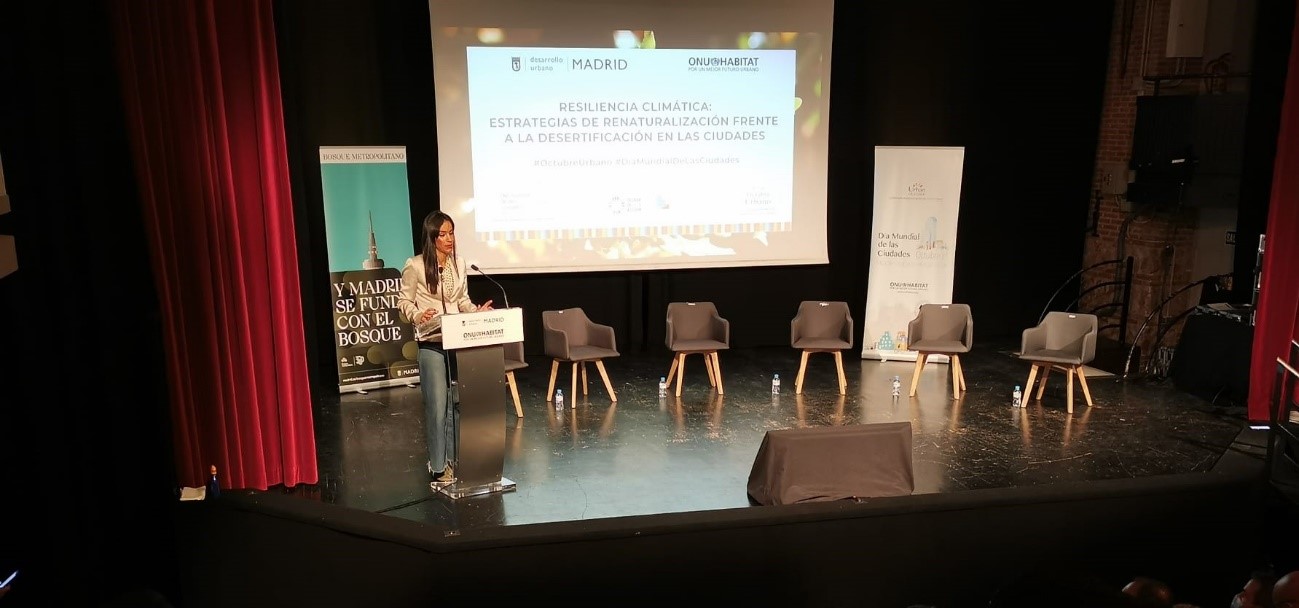Madrid, Spain, 25 November 2021 - Madrid City Council and UN-Habitat organised a debate to exchange ideas to combat the heat island of cities in commemoration of the World Cities Day.
The Urban Development Area of Madrid City Council and UN-Habitat commemorated World Cities Day this Tuesday, which took place on October 31, with a conference on climate resilience in which experts from different places have debated on the re-naturalization strategies to make facing the desertification of cities.
The conference was opened by the deputy mayor of Madrid, Begoña Villacís, who highlighted the City Council's commitment to "Madrid grow with nature, because it is a matter of life." Villacís has detailed the Metropolitan Forest project, the great green infrastructure of 75 kilometers that will border the capital and that, as he explained “is a dream that our children will enjoy”, for which he recalled, “now is the time to leave to speak to act.” Deputy Mayor of Madrid also stated that "the time has come to stop talking to act."
Madrid isla de color the strategy of the Urban Development Area of Madrid, is a commitment to green infrastructures, with projects such as the Metropolitan Forest, to fight against desertification.
In this same aspect, Carmen Sanchez-Miranda, head of UN-Habitat office in Spain, also stated that “the moment for action against climate change is now,” for which is needed to integrate sustainability into urban policies.
The Urban Development delegate, Mariano Fuentes, closed the day by insisting that “in the face of the challenges posed by desertification we have two alternatives: act or wait for others to do so. And it has been a year and a half that we took, from the Urban Development Area, the political initiative to reverse the heat island effect of Madrid and prevent it from being a desert in a few decades.”

This policy of action, as he stated, is materialized in the Madrid, island of color strategy, a comprehensive commitment to transform the urban space and modernise the city through renaturalisation, the battle against climate change and the improvement of the environment. ‘Madrid, island of color’ is materialized, as the delegate recalled, in “three ambitious projects”: the Metropolitan Forest, the renaturalisation of public space and Producer Neighborhoods. "We do not intend to invent anything, but to look at examples that already work in other cities," concluded Fuentes.
Throughout the day, the different participants agreed on the need to move from transforming words into action based on data and clear information. It is key that public administrations, private sector and citizens go together and get involved in those projects that offer solutions aimed at giving nature more weight in the development of cities because this redounds to the benefit of all.
World Cities Day aims to promote global interest towards more sustainable urbanism, boost cooperation between countries and cities to find opportunities and address challenges of urbanization. The theme the WCD 2021 has been framed is Adapting Cities for Climate Resilience.
In the debate, there was a discussion about the growing threat of desertification, the process of land degradation in arid, semi-arid and dry sub-humid areas resulting from various climatic and human factors. Furthermore, by 2030 almost 60 per cent of the world's population will live in urban areas. Therefore, cities are not immune to the challenges of desertification. That's why, to fight against this phenomenon, Madrid City Council has implemented the Madrid, island of color strategy.